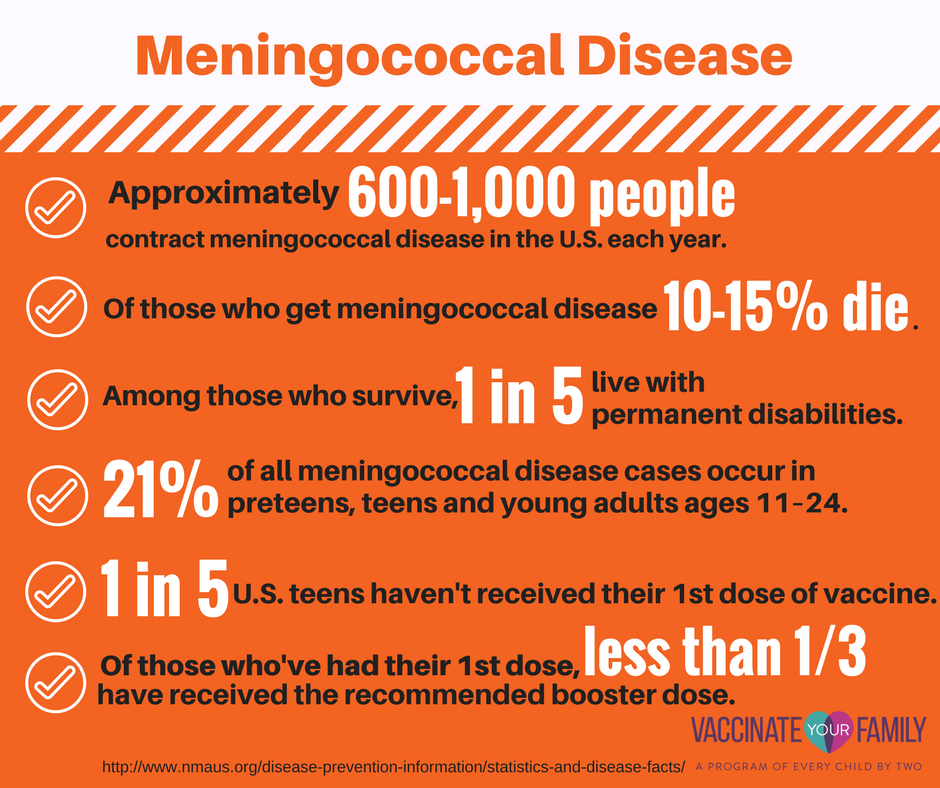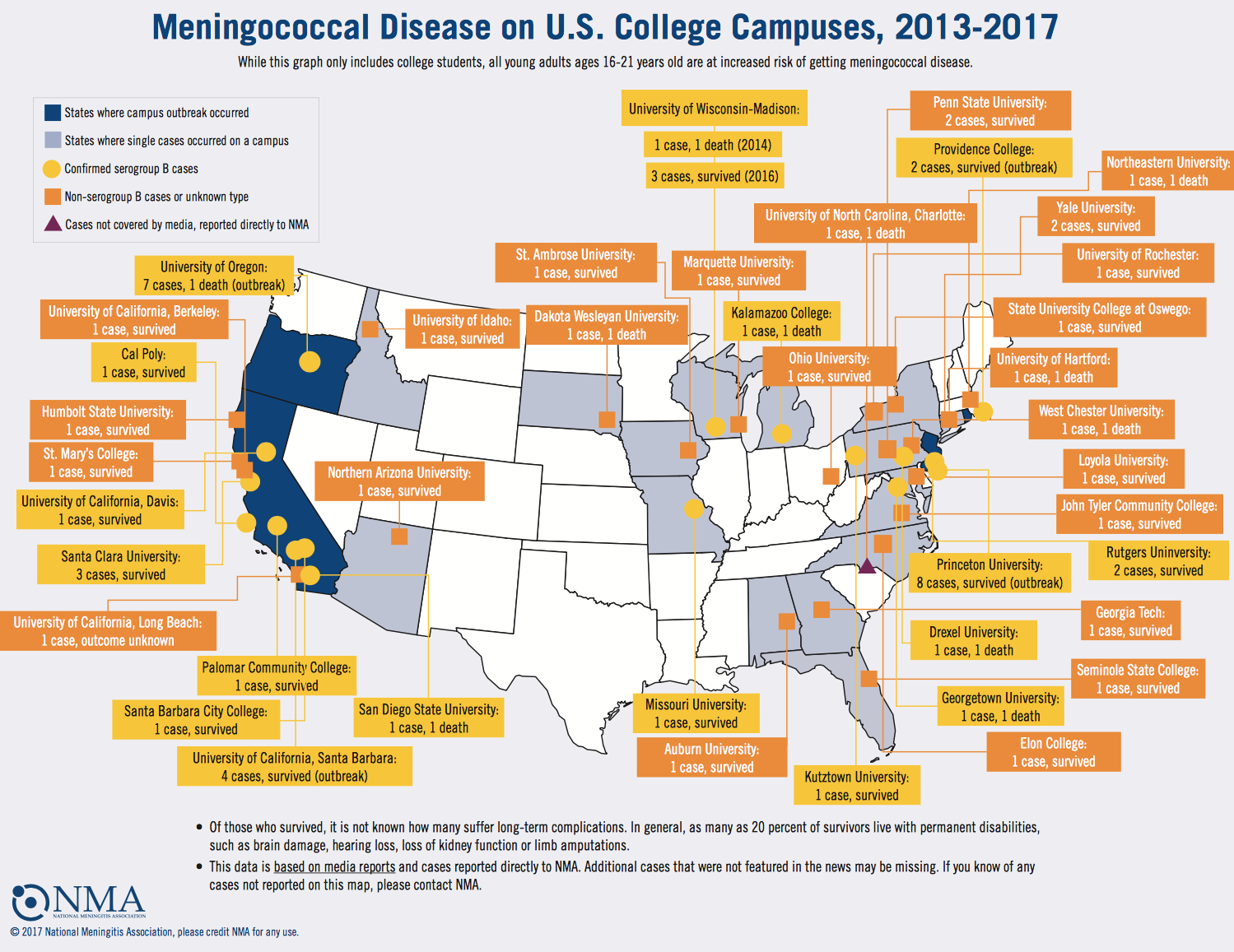
What Parents of Every Teen Should Know About Meningitis
The most important thing parents of teens need to know about meningococcal disease is that it can be very serious. And by serious, we mean debilitating and often deadly.
Even with prompt medical treatment, about 1 in 10 people with meningococcal disease will die from it. Of those who survive, about 1 to 2 will have permanent disabilities such as brain damage, hearing loss, loss of kidney function or limb amputations.
The best thing parents can do to protect their children from meningococcal disease is to get them vaccinated against all of the preventable forms of the disease.
What causes meningitis and meningococcal disease?
Meningitis refers to a swelling of the protective membranes that cover the brain and spinal cord. While meningitis is commonly caused by a bacterial or viral infection, it can also be caused by injuries, cancer, certain drugs, and other types of infections.
Meningococcal disease is specific to any illness caused by the bacterium Neisseria meningitidis (also referred to as meningococcus or meningococcal meningitis). These types of infections can cause meningitis, but can also cause bloodstream infections (known as bacteremia or septicemia).
It’s possible to have meningitis without having meningococcal disease, and it’s possibly to have a type of meningococcal disease that isn’t necessarily meningitis. The specific cause of illness is important to identify because the treatment differs depending on the cause.
- Bacterial forms of meningitis can be extremely dangerous and fast-moving and have the greatest potential for being fatal. The long-term effects of bacterial meningitis can include multiple amputations, hearing loss and kidney damage. Many, but not all, forms of bacterial meningitis can be prevented by vaccination.
- Viral meningitis has similar symptoms to bacterial meningitis, but for the most part is neither as deadly nor as debilitating. There is no specific treatment available for viral meningitis, but most patients fully recover over time.

Who is at risk?
While anyone can contract meningococcal disease, adolescents and young adults are among the population who have a higher risk for the disease due to their lifestyle factors. For instance, the risk of meningococcal is higher for those who are living in crowded settings such as college dormitories, boarding schools, sleep-away camps or military barracks. Other factors that can raise the risk of infection include:
- Attendance at a new school with students from geographically diverse areas
- Irregular sleeping patterns
- Active or passive smoking
- Social situations where there is crowding
- Moving to a new residence
How is it spread?
About one in ten people carry meningococcal bacteria in their nose or throat without showing any signs or symptoms of the disease. These people can unknowingly transmit the bacteria to others through the exchange of respiratory secretions during close or lengthy contact with someone’s saliva, such as through kissing or coughing, especially if they are living in close quarters. Although meningococcal bacteria are very dangerous, they cannot live outside the body for very long. This means that while contagious, the infection is not as easily spread as a cold virus.
How can it be prevented?
Currently, vaccination is the best defense against meningococcal disease. There are five major serogroups of meningococcal disease (A, C, W, Y and B). The three most commonly seen in the United States are B, C and Y, with one-third of all cases in the U.S. being of serogroup B.
In order to be protected against all the preventable strains of meningococcal disease, teens need to receive multiple doses of two different kinds of meningococcal vaccines.
Meningococcal Conjugate Vaccine (MenACWY): Routine vaccination with the conjugate is recommended at age 11-12 to protect against serogroups A, C, W and Y. Adolescents should also get a vaccine booster dose at age 16.
Meningococcal Serogroup B Vaccine (MenB): This vaccine is recommended for people 10 years or older who are at increased risk for serogroup B meningococcal infections including:
- People at risk because of a serogroup B meningococcal disease outbreak.
- Anyone whose spleen is damaged or has been removed.
- Anyone with an immune system condition known as “persistent complement component deficiency”.
- Anyone taking a drug called eculizumab (Soliris).
- Microbiologists who routinely work with N. meningitidis isolates.
The CDC also recommends permissive use of the MenB vaccine for adolescents and young adults age 16-23, with a preferred age of 16 to 18. A permissive recommendation means that it is at a doctor’s discretion whether they will recommend the vaccine to those who don’t fall into the categories listed above. If a provider doesn’t feel the patient is at risk, they may fail to mention the availability of the vaccine.
This does not mean that a parent can’t request or receive the vaccine for their child.
It’s critical that parents understand that serogroup B meningococcal disease is not only the most common cause of meningococcal disease in adolescents and young adults, but it has also cause several outbreaks on college campuses over the past few years.

Graphic compiled by the National Meningitis Association
The vaccine has been deemed safe by the FDA, and has been recommended by the CDC, so parents should feel comfortable getting the vaccine for their child, especially if they feel they are at risk of exposure. If a child is attending college, parents may want to take the precaution of getting them vaccinated before they arrive on campus. In the case of an outbreak, the vaccine will be recommended. However, if your child is exposed before the outbreak is identified than it may be too late to benefit from the vaccine.
What are the symptoms and can it be treated?
The symptoms of meningococcal disease are the same for all of the serogroups. Unfortunately, it is not easy for healthcare professionals to identify and diagnose the infection in its early stages and it’s often mistaken for the flu or other viral infections. Symptoms tend to develop over several hours or over one or two days, and may include:
- Sudden high fever
- Severe headache
- Stiff neck
- Vomiting or nausea with headache
- Confusion or difficulty concentrating
- Seizures
- Sleepiness or difficulty waking up
- Sensitivity to light
- Lack of interest in drinking and eating
- Skin rash
Meningococcal disease can be treated with antibiotics, but treatment must begin early to be effective. Even if treatment is started as soon as possible, it might not prevent death or serious long-term complications such as hearing loss, brain damage, kidney disease or limb amputations.
Today we are grateful for moms like the ones featured in this video who are helping to raise awareness about the two available meningococcal vaccines for adolescents and young adults. May their stories help parents to make educated decisions about disease prevention.
Visit the following websites for more information on the dangers of meningitis and how it can be prevented.
Vaccinate Your Family – PreTeens & Teens Meningococcal Disease
National Meningitis Association